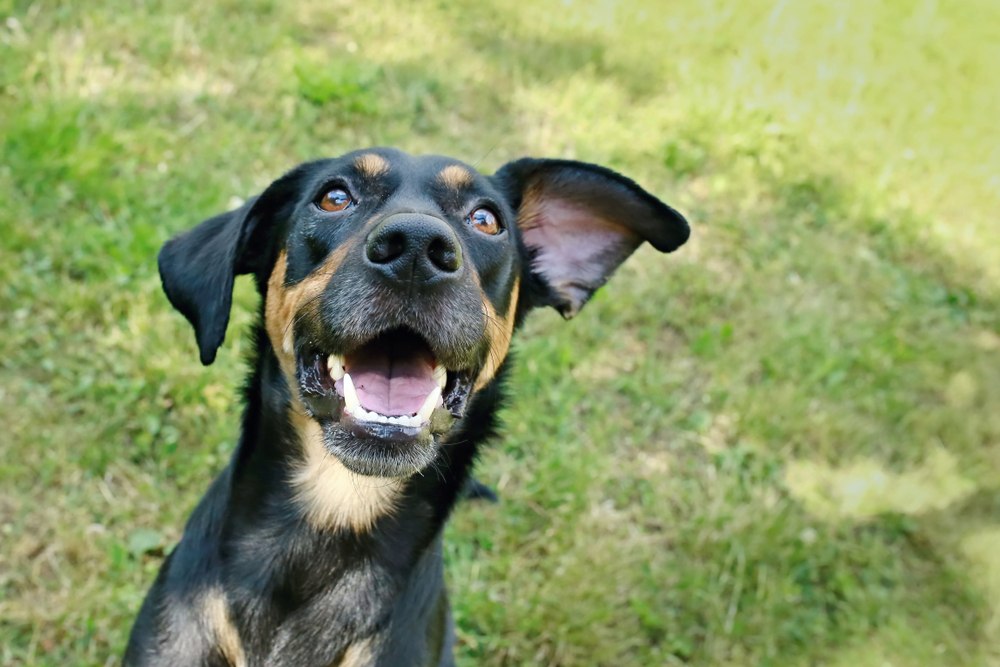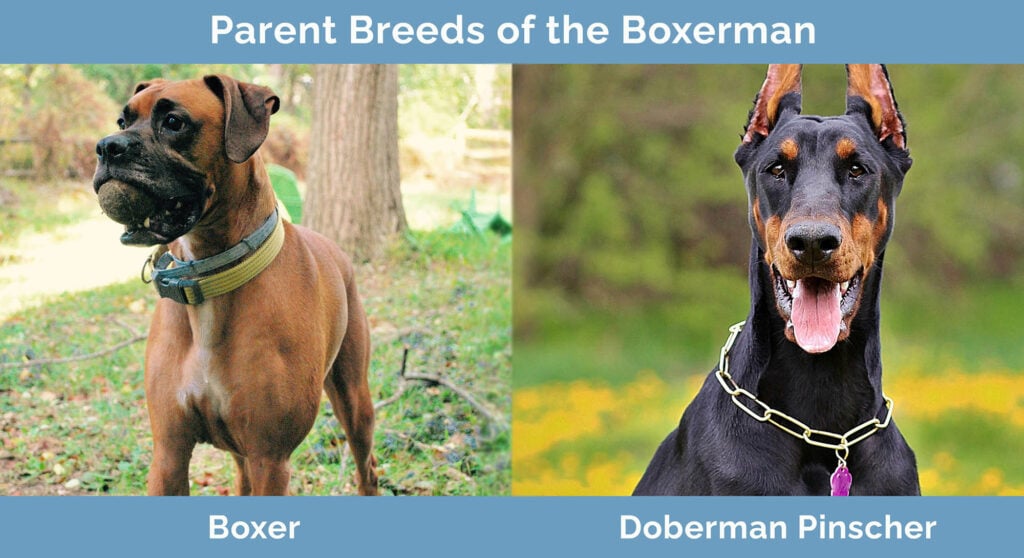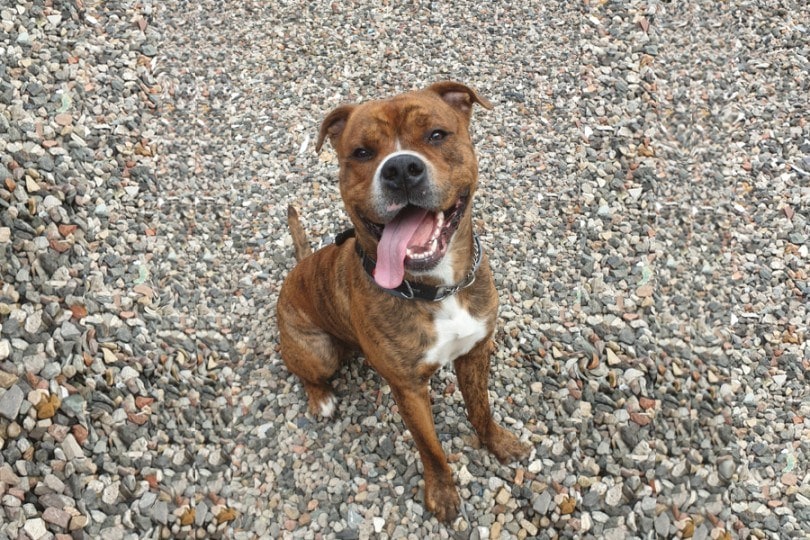Boxerman (Boxer & Doberman Pinscher Mix): Info, Pictures, Characteristics & Facts

Updated on

| Height: | 21–25 inches |
| Weight: | 50–70 pounds |
| Lifespan: | 10–14 years |
| Colors: | Brown, black, chocolate, gold, fawn, brindle, spotted |
| Suitable for: | Watchdog duty, families with children, homes with small pets, moderate climates |
| Temperament: | Loyal, clever, devoted, alert, loving toward family, suspicious of strangers |
Born of a cross between two incredibly loyal and loving breeds, the Boxerman may very well be the perfect guard dog for homes and families.
Sociable and friendly with people they know but highly suspicious of strangers and odd noises, the Doberman Boxer Mix is at once loving and alert to danger. If you’ve been looking for a dog that’s as good at keeping your home safe as they are at cuddling, this breed may be right for you!
Bred from the Boxer and the Dobermann Pinscher, the Boxerman has an imposing physique that belies a marked sensitivity to heat and cold. If you’re thinking about welcoming one of these designer dogs into your life, read on to learn more about what to expect when buying, caring for, and training a Boxerman from puppy to adult.
Boxerman Puppies
To understand whether the Boxerman is the right breed of dog to add to your home and family, it’s helpful to understand their heritage and origins. To that effect, let’s look at the characteristics of each of their German parent breeds before discussing how they uniquely co-mingle in the Boxerman.
The Boxer, a descendant of the Old English Bulldog and a now-extinct German breed known as the Bullenbeisser, was developed in Germany as a hard-working dog ideal for guarding the home and their master. Seen variously as a working dog, show dog, and companion animal, the Boxer was even employed during the war efforts of World War I and World War II as an attack dog.
Named for their tendency to stand on their hind legs and “box” with their front paws, Boxers have continued to be bred into friendly and loyal companion animals that are popular as family dogs.
Dobermann Pinschers, known simply as Dobermann in their homeland of Germany, are equally as alert and intelligent as Boxers. Known for their long muzzles, graceful gaits, and intense loyalty to their owners, they were originally bred to provide protection to their owners.
While their reputation for ferociousness and aggression may have been warranted at some point in the breed’s history, modern breeders have continued to shape the Dobermann into a friendly and affable breed. Socialization from a young age will almost always result in them being a loyal companion animal, as well as a proficient guard dog.
Thankfully, the Boxerman has inherited the most desirable traits of both of their parent breeds and lost much of the aggression and stubbornness that can still be present in both parents. Kind, sociable, and loyal to the extreme, the Boxerman has a gentle nature to complement their stout physique. Besides being ill-suited to extremely cold or hot temperatures, they enjoy a high degree of health and generally long lifespans.

 Temperament & Intelligence of the Boxerman 🧠
Temperament & Intelligence of the Boxerman 🧠
Clever, loyal, and alert are the three primary characteristics of every Boxerman dog that you’ll meet. Capable of learning tricks and commands with relative ease, they make excellent guard dogs due to their suspicion of strangers and stout physical stature.
Around their owners and people they know well, Boxermen are playful and energetic and love to be cuddled and roughhoused with. Confident in their physical abilities, Boxermen can also be seen to display a wonderfully gentle side that enjoys lounging and snuggling with their friends.
Are These Dogs Good for Families? 🏡
Whether employed as a guard dog or not, the Boxerman makes an excellent family pet. Extremely loyal and devoted, they form intense bonds with both their primary owner and any of their family members and will gladly live their lives in service to their families. Combine this with a generally friendly and often gentle demeanor, and the Boxerman can easily get along well with children and adults of all ages.
Does This Breed Get Along With Other Pets? 🐶 😽
Much of a Boxerman’s ability to live with other pets will be determined by their early life and upbringing. Because each of these dogs can have markedly different personalities when it comes to socializing, it’s important to introduce them to many other dogs and small animals when they are a puppy. Otherwise, you may see them display unnecessary aggression and territorial behaviors once they’re fully grown.
Things to Know When Owning a Boxerman:
There’s no doubt that the Boxerman can make an excellent addition to many homes. Do you think they might be the right pet for you? If so, read up on the following topics to learn more about the responsibilities and requirements for owning this lovely breed.
Food & Diet Requirements 🦴
As a large breed, a Boxerman will require an equally large amount of high-quality dry dog food to keep them healthy and well-fed. For an average-sized Boxerman, expect to feed them 3 to 4 cups of dry dog food per day. It’s wise to split this amount into at least three meals, as large dogs can tend to eat their food too quickly and cause themselves digestive problems.
Exercise 🐕
Despite their highly alert natures, Boxermen are just as happy to spend much of the day lounging around on the couch with you as they are to be outside playing. Around 1 hour a day of moderate activity is enough to keep them in robust health. This can include a combination of long walks, playing fetch, or learning new tricks and commands.
It’s important to note that the Boxerman’s short coat and lean build make them poorly disposed to time spent in exceptionally hot or cold climates. You’ll need to be especially mindful of this during the hottest days of summer or coldest days of winter, where your Boxerman may not be inclined to spend time outdoors at all.
Training 🦮
The Boxerman is a smart dog that trains rather easily once you’ve established dominance in your relationship. They respond well to firm commands and positive reinforcement and will often come to enjoy the interaction and the mental and physical stimulation of learning new commands.
Consider enrolling your Boxerman in obedience classes from an early age to solidify the best behaviors possible in this breed. Exposing them to environments with other dogs can be especially helpful at this time, as it will acclimate them to sharing their space with other animals and tone down any aggressive tendencies.
Grooming ✂️
The Boxerman’s grooming requirements are decidedly few, as they are not prone to shedding much from their short coats. Weekly brushings will help keep them looking their best, and a monthly bath with dog-friendly shampoo will prevent the development of any unpleasant odors.
Additionally, it’s helpful to plan regular teeth cleanings and toenail trimmings for your Boxerman. If you’re uncertain how to do so, it’s wise to schedule an appointment with your vet or a professional dog groomer where you can observe how to best take care of your pet at home.
- See Also: Best Dry Dog Shampoos
Health and Conditions ❤️
Due to the fact that they’re a crossbreed, the Boxerman is not prone to many ailments. Nevertheless, it may be helpful to stay aware of some of the illnesses their parent breeds can suffer from. Conditions to look out for include the following.
- Cataracts
- Corneal dystrophy
- Color dilution alopecia
- Cardiomyopathy
- Subvalvular aortic stenosis
- Von Willebrand’s disease
- Degenerative myelopathy
- Intervertebral disc degeneration
Male vs. Female
The Boxerman displays little to no variation in their temperament depending on their sex, though male dogs do tend to grow larger than females. Personalities seem to vary more from dog to dog in this breed than many others, so if you’re looking for particular attributes, it’s wise to play with individual puppies before deciding on one.
3 Little-Known Facts About the Boxerman
1. They Are a Member of the Molosser Group of Dogs
Even further back than their Boxer and Dobermann ancestors, Boxerman dogs are related to the Molossian Hound, an ancient dog breed renowned throughout Greek literature for their large size and legendary ferocity. Even Aristotle was awed by their nature, commenting that they were remarkable for both their courage and endurance in hard labor.
2. The Boxerman Makes an Excellent Police Dog
Thanks to their heritage from two willful, alert dogs that were bred for loyalty and guarding, Boxerman dogs are now trained to join K9 police units around the United States. In this capacity, they are respected for their ability to quickly learn and retain commands, as well as their tenaciousness when given a target to chase or attack.
3. They Can Be Quite Good With Small Pets
Boxerman dogs do not tend to have a high prey drive like those of the Terrier or Retriever families and can easily be trained to be gentle with small animals. If you already own rabbits, birds, ferrets, or rats, introducing a Boxerman puppy to them early in their life will likely lead to long-term friendship bonds.
Final Thoughts
Possessing many of the best characteristics of both Boxers and Doberman Pinschers, the Boxerman is exceptionally well suited to life with a large family. Their heritage makes them equally qualified for life as a guard dog or working dog on a farm, where their loyal and devoted natures will no doubt lead to lifelong bonds with their owners.
See also:
Featured Image Credit: Lioneska, Shutterstock

 Temperament & Intelligence of the Boxerman
Temperament & Intelligence of the Boxerman 











